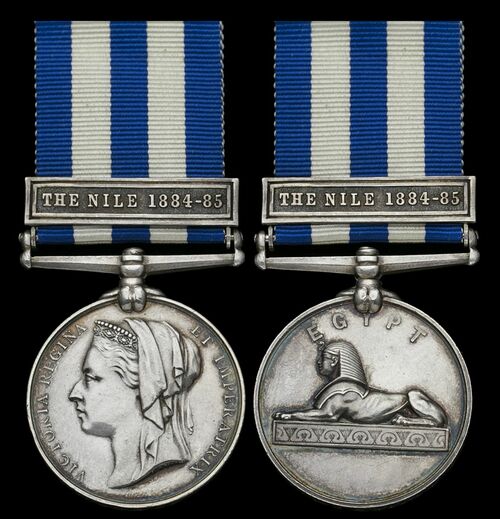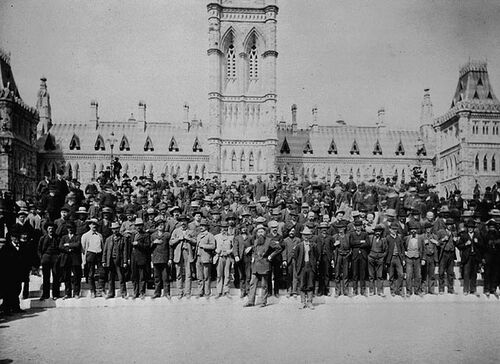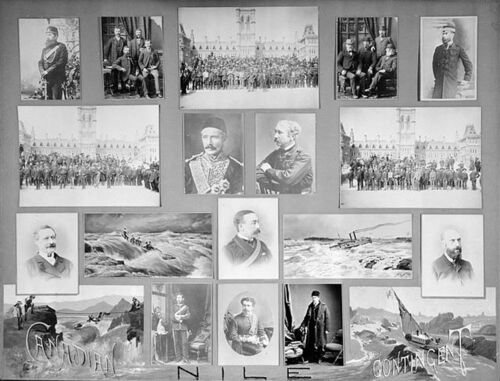Auction: 23003 - Orders, Decorations and Medals
Lot: 44
(x) Egypt and Sudan 1882-89, undated reverse, 1 clasp, The Nile 1884-85 (370. Boatn. J. Wilson. Ottawa Contgt.), good very fine
Provenance:
Ex-W.W.C. Wilson Collection, Wayte Raymond, New York City, November 1925, Lot 737.
Approximately 392 Canadian boatmen received the medal for the Nile campaign, of which 169 served in the Ottawa Contingent.
The Canadian Encyclopedia gives a good account of the Canadians on The Nile:
'[Garnet] Wolseley had been assigned to Canada in 1861. From May to August 1870, he recruited 400 voyageurs (including 100 Haudenosaunee) to transport British troops and Canadian militia through 1,000 km of rivers, lakes and portages in response to the Red River Resistance. Wolseley’s Sudan mission would be similar in that he planned to move troops to Khartoum in a flotilla of boats up the Nile River.
In a message to the Canadian governor general, the Marquess of Lansdowne, Wolseley requested 300 Indigenous voyageurs from Caughnawaga (Kahnawake), Saint-Régis and Manitoba. Canadian prime minister Sir John A. Macdonald demanded that they serve as part of the British service and be paid by Britain.
There was an overwhelming response to newspaper advertisements that offered $30 to $40 per month plus expenses. In total, 379 boatmen were recruited for the expedition. Canadian Lieutenant-Colonel Frederick Denison, who had served in the Fenian Raids and Red River Resistance, was appointed to lead the contingent. He was joined by four other Canadian militia officers, a medical officer and hospital sergeant, and a priest.
The voyageurs who met in Montreal in September 1884 comprised English and French Canadians and more than 100 Métis, Mohawk and Haudenosaunee. Most were experienced boatsmen, but many were lumbermen and others seeking adventure.
The voyageurs arrived in Alexandria on 7 October 1884 and took a train to Asyut, passing Cairo on the way. Waiting for them were the 9-m-long wooden whaling boats that they would use to transport about 5,000 troops and supplies. The boats had to travel 2,300 km south against the strong Nile current. The whalers were chained to steamboats and towed on the journey’s first leg. On 26 October, they arrived at the British garrison at Wadi Halfa. The steamboats could take them no farther.
Six-men crews rowed from sunrise to sunset. In shallow sections, they had to push the boats forward with long poles. Rapids forced men to either wade while pulling the heavy boats with ropes or undertake laborious portages. Accompanying the flotilla was a camel caravan of 1,800 British soldiers. It carried supplies, helped with portages, and offered protection from Mahdi.
In January, the voyageurs’ enlistments expired and most opted to return to Canada. They were welcomed in Ottawa with a celebratory meal and parade. Meanwhile, at Korti, Wolseley sent the caravan south. Those who had re-enlisted (about 85 in number) embarked on the Nile’s long loop east, south, and then back west to reunite with the caravan. Progress was slowed by unexpected rapids. On 17 January, the caravan was attacked at Abu Klea. The British troops defeated the attacking Mahdi but suffered 380 casualties.
On 26 January, a force of 50,000 Mahdi took Khartoum. Thousands of slain bodies lay on the streets and Gordon’s severed head was displayed on a pike. The flotilla arrived two days later.
On 10 February, the British troops fought a large force of Mahdi near Kirbekan. While the voyageurs stayed with the boats, Denison joined in the battle. The British were victorious, inflicting heavy casualties on the Mahdi force. Between 200 and 700 Mahdi died during the battle, compared to 12 British soldiers. The British force was then ordered to retreat to Egypt. As this meant running the river, the skills of the Canadian boatmen were crucial, particularly in sections with dangerous rapids. The flotilla reached Wolseley at Korti on 8 March and the Canadians left for Alexandria soon after. On 17 April, they sailed for England; their expedition was over.'
Subject to 5% tax on Hammer Price in addition to 20% VAT on Buyer’s Premium.
Sold for
£2,000
Starting price
£800









